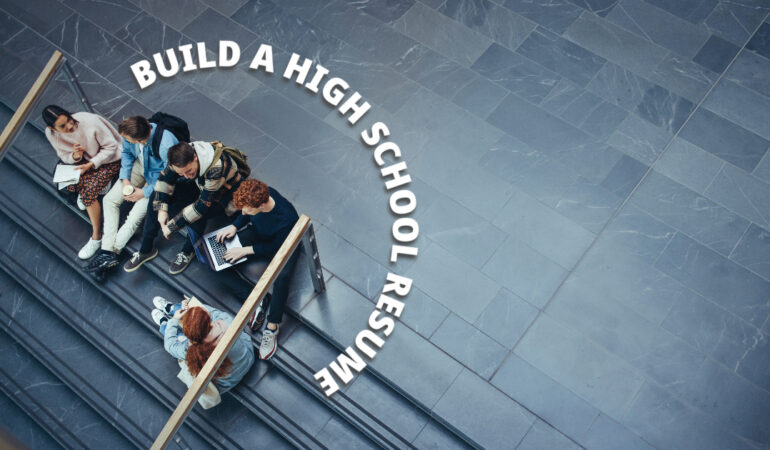A high school resume is not just a document; it’s a reflection of your journey, experiences, and potential. Building a strong high school resume can open doors to college admissions, scholarships, and future opportunities. In this blog, we’ll explore the essential steps to create a compelling high school resume that showcases your skills, achievements, and character.
Start Early
Building a high school resume is a gradual process that should begin as soon as you enter high school. The earlier you start, the more time you’ll have to accumulate experiences and shape your narrative. It’s never too early to set goals and plan your path to success.
Academic Achievements
Your academic achievements are the foundation of your high school resume. Maintain a strong GPA, take challenging courses, and strive for excellence. Highlight any honors, awards, or recognition you receive, such as being on the honor roll, winning academic competitions, or receiving scholarships.
Extracurricular Activities
Participation in extracurricular activities can demonstrate your interests, leadership skills, and commitment. Join clubs, sports teams, or student organizations that align with your passions. Leadership roles, like club president or team captain, can make your resume stand out.
Volunteer Work
Volunteering not only contributes to your community but also adds depth to your resume. Document your volunteer work, emphasizing the impact you’ve made and the skills you’ve developed. Consider volunteering in areas that relate to your future goals, whether it’s healthcare, education, or environmental conservation.
Work Experience
Part-time jobs, internships, or summer employment can provide valuable experience and skills. Describe your roles, responsibilities, and achievements in each job, emphasizing skills like communication, teamwork, and problem-solving.
Personal Projects
If you have personal projects, hobbies, or passions that are relevant to your future aspirations, include them on your resume. For example, if you’re an aspiring filmmaker, mention any films you’ve created, film festivals you’ve participated in, or workshops you’ve attended.
Leadership and Achievements
Highlight any significant accomplishments or leadership roles in your activities. Whether it’s winning a debate competition, organizing a charity event, or leading a community project, these experiences showcase your character, initiative, and potential.
Skills and Abilities
Incorporate a section that lists your skills and abilities. This can include language proficiency, computer skills, artistic talents, or any certifications you’ve earned. These skills can set you apart and make you a well-rounded candidate.
Awards and Honors
Don’t forget to showcase any awards or honors you’ve received. This could be recognition for academic excellence, community service, or achievements in specific areas like music, sports, or science competitions.
References
Include references from teachers, mentors, or supervisors who can vouch for your character and abilities. Their endorsements add credibility to your resume.
A well-crafted high school resume is a powerful tool for opening doors to your future. It not only helps with college admissions but also lays the foundation for success in your personal and professional life. As you work on your high school resume, remember that it’s not just about the quantity of activities but the quality of your experiences and the stories you can tell. Start early, stay committed to your goals, and let your resume reflect your unique journey and potential. Your high school years are an opportunity to build a resume that will help you achieve your dreams. If you need guidance building a high school resume, we have tutors who are here to help you every step of the way.



Ingenuitydisplay
Is it fair that high school students are judged and evaluated based on their resume for college admissions and scholarships, rather than their potential and character? Should there be a more holistic approach to evaluating students beyond just their extracurricular activities and achievements?
GSPAdmin
Thanks for your comment!
I certainly understand your question and concern! I think many schools across the country glean what they can from the “resume” and each school will value the different pieces in a way that can be quite different from another nearby/similar school. For instance, if a school values community service, they may weight the number of hours, types of projects, and the initiative of a student to engage with their community. Another school may more heavily weight the leadership experience – whether it’s within a club, sport, or other extra-curricular activity at school or community-based. I think many schools use some of the pieces from the resume to begin forming an opinion about the character of the student. It’s not to say that a student with very little on their resume doesn’t have high character, just that they may not be pushing themselves quite as much as some other students.
Similarly, many schools receive far more applications than they can evaluate on a 100% personal level – so they may be using pieces of the student resume to begin to narrow the field, so to speak, in order to get to a more manageable number of students to which to connect with at a higher level – whether through their essays, interviews, and/or campus visits.
I hope this provides a little more context…it can be quite nuanced, especially since every college develops their own unique flavor to the admissions process.